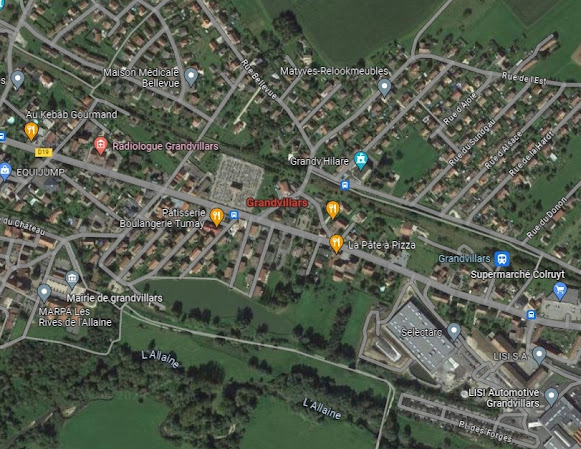Recently, it occurred to me that my daughter’s ancestors came to America to get people back in church (Rev. Jacob Ware) or to make money (Baldwin Rockett) or to own land (too numerous to name). My son-in-law’s ancestors came to America because of a regional crisis (Jacques Mercier and possibly others) or persecution (Daniel Couturier). With Thanksgiving Day just two weeks away, I am grateful to all the ancestors who made tremendous sacrifices to leave their families and homeland and come to America. Regardless of the reason why, it appears that they regretted nothing because they didn’t go back!
Being an American, it is hard to imagine what life would be like if there were neighboring countries threatening to invade at any moment. But that has been, and still is, the reality for people living in Europe and around the Black Sea.
In my post “Lailhengue > Mercier & Mercier - Alsace, France”, I looked at the lives of our Jacques Mercier and his son, Francois Mercier, after they arrived in New Orleans, and I posed the question regarding Jacques, “I wonder why was he in such a hurry to leave everything behind and start over in another country at age 57?”
Now, our Merciers come from the modern-day area of France called the Territoire-de-Belfort (Department 90). It’s a small area just southwest of Haut-Rhin. It was once a part of Alsace, but since Belfort resisted the Germans during the Franco-Prussian War (1870-1871), Germany did not annex Belfort.
Location of Territoire de Belfort in France by Marmelad from Wikipedia.org
The Merciers lived in and around Grandvillars in Belfort. Here’s an aerial view of Grandvillars, France, today thanks to Google Satellite Maps:
Oh, look: the huge cemetery is right in the middle of town! Lots of beautiful farm land. Pretty, but not a lot to do here.
Regarding the historical area of Alsace (which included Belfort before 1871), too much has been written about its’ turbulent past. Passed back and forth between France and Germany too many times to list here, it has been a pawn in the political ambitions of both countries. One day, you’re a French citizen speaking French and German, and Catholic; the next day, you’re a German citizen being told to only speak German and finding out your church is resisting German authorities.
From the time Jacques’ father was born in 1778 until Jacques’ son, Francois, emigrated to the United States in 1872 (a 94-year period), France went through six governmental changes and was involved in 43 wars/conflicts. Every year (except for the years 1816-1820) men were needed to fight. Imagine the toll this took on families, especially women, who relied on men to keep a roof over their heads and, as widows, relied on family to support them.
The painting La Force (meaning Strength) by Belfort’s painter, Francois Joseph Heim, in 1817 (from Le Republicain Lorrain), says one thing but, to my untrained eye, depicts another. The symbol of France as a woman in armor seems clear, but the lion could represent parts of Germany. The lion also reminds me of Belfort’s city symbol after the Franco-Prussian war. To me, this “France” looks more fatigued, has kicked off her boots, resting on and being supported by the “Lion”, perhaps the Belfort lion:
This is the world our Merciers and other Alsatian ancestors lived in, and probably sought refuge from, during the 1800s. I think by about 1869, the people of Belfort (a part of Alsace, France) and our Merciers could see the writing on the wall: France wanted to expand east, Germany wanted to unite all German-speaking areas under one umbrella, and Alsace was stuck in the middle.
This is where I think our Merciers transitioned away from France:
1869-bef Nov 1871 - Jacques Mercier and Catherine Flotat leave for New Orleans (see “Ports of Call: Lailhengue > Mercier & Mercier - Alsace, France” for Jacques in New Orleans)
1870 Jul 19 - the Franco-German War (also known as Franco-Prussian War and War of 1870) started with French troops outnumbered 2.5 to 1.
1870 Sep 25 - with Alsace experiencing fighting before most of France, the Germans take Strasbourg, the capital of Alsace
1871 Feb 26 - the Preliminaries of Peace are signed
1871 May 10 - the Treaty of Frankfurt is signed ending the war and ceding Alsace (but not Belfort) to Germany. From Wiki “…after the loss to Germany of most of Alsace in 1871, the Belfort population was boosted by the arrival of large numbers of refugees from "Germanisation"”
1872 May 10 Grandvillars, Belfort, France, Census - our Francois Mercier age 28 and Catherine Thomas age 28 are still living in Belfort with their first two children
1872 Oct 1 - deadline to let German authorities know if they will retain French citizenship. With so many people fleeing Alsace, Grandvillars and surrounding towns were probably becoming small refugee camps trying to keep up with feeding, housing, and taking care of the influx of sick, elderly or disabled people from Haut-Rhin just up the road
Even by today’s standards, getting from Grandvillars to the dock at Le Havre is quite a journey. It’s a 12-hour straight drive or a 6-hour train ride, probably even longer back in 1872:
1872 Nov 25 - Francois Mercier and family depart Le Havre, France, bound for New Orleans, LA
The Grand Dock at Le Havre (1872) by Claude Monet
1872 Dec 18 - Francois Mercier and family arrive in New Orleans, LA
Merry Christmas! ~ Joyeux Noël! ~ Fröhliche Weihnachten!








No comments:
Post a Comment